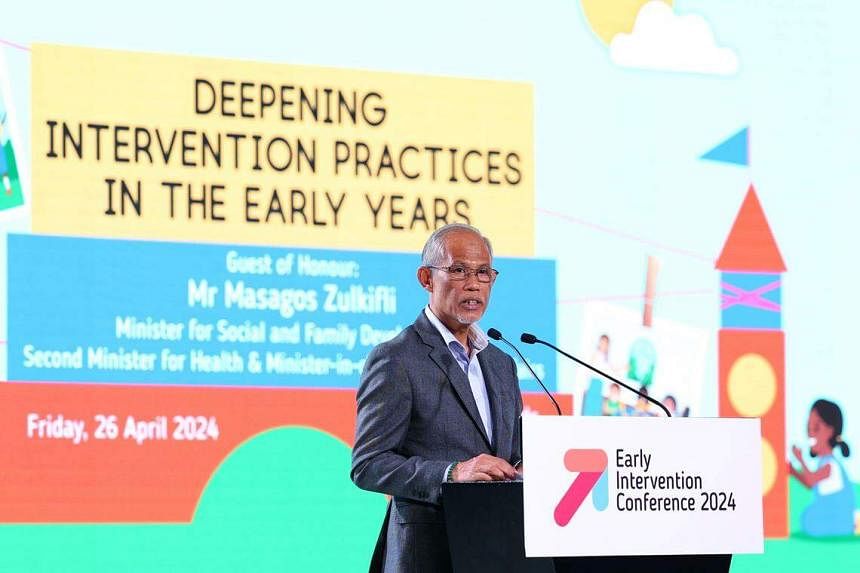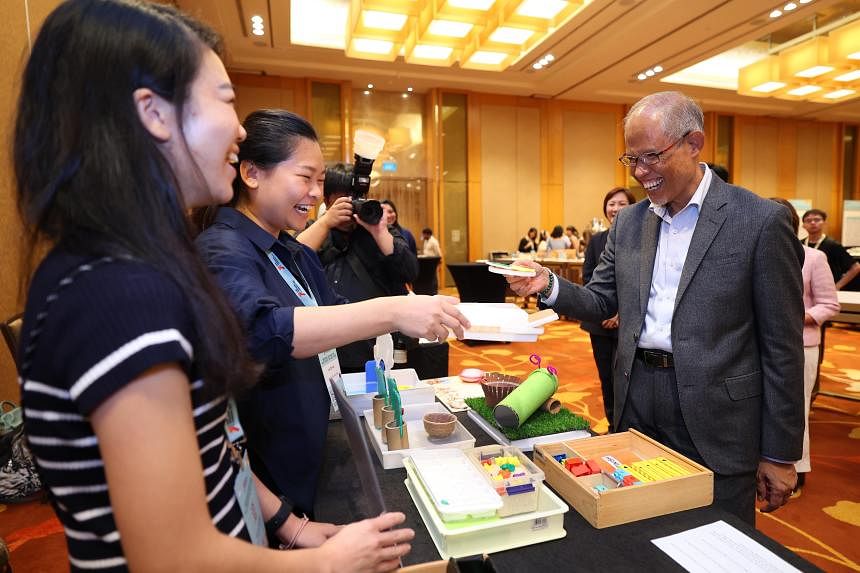SINGAPORE - Educators who support young children with developmental needs will receive higher salaries in the coming years.
These professionals, known as early intervention educators, will see an increase of about 3 per cent to 16 per cent per year in their annual pay package over the next three years, said Minister for Social and Family Development Masagos Zulkifli on April 26. This will come in the form of monthly salary increases, performance bonuses and other variable payments.
The move comes on the back of the Education Ministry announcing higher salaries for special education teachers, and the Government ramping up early intervention programmes, which include developmental, therapy and education support, for children.
Mr Masagos said the salary increases are meant to help the sector attract and retain talent. He was speaking at the Early Intervention Conference organised by 10 Early Intervention Programme for Infants and Children (Eipic) providers, held at Marina Bay Sands.
Mr Masagos said the Early Childhood Development Agency (ECDA) has set salary benchmark targets for early intervention roles for social service agencies (SSAs). This is done in tandem with the recommended salaries for jobs in the social service sector under guidelines published by the National Council of Social Service (NCSS) on April 1, he added.
“As early intervention educators attain more skills and competencies and their job responsibilities expand, their salaries should also grow,” he said, adding that SSAs will be adjusting to meet these salary targets within the next three years.
In its latest guidelines, NCSS raised the recommended starting pay for early intervention educators by 3 per cent from $3,560 to $3,670 and the reference point from $5,230 to $5,390.
For senior early intervention educators, the recommended starting salary was raised by 2 per cent from $5,050 to $5,150, and the reference point from $6,850 to $6,990. The reference point refers to salaries for staff who are competent at their jobs, but whose wages are not at the maximum point yet.
“ECDA is working with SSAs to improve the salary for various early intervention job roles to be at the reference point for their respective job grades,” said an ECDA spokesman. “Other early intervention job roles can expect similar salary increases.”
The spokesman added that the actual salary increases for each individual would depend on factors such as their years of experience, job responsibilities and performance. “Operators will have the flexibility to assess and determine the salary increases for each staff.”
The spokesman said there are now 1,300 individuals in the early intervention workforce, comprising 760 early intervention educators, as well as therapists, psychologists, social workers, and learning support educators – who work in pre-schools to support children with developmental needs.
The sector needs about 400 more educators by 2027, he added.

Mr Masagos said the sector will see a boost with 1,500 early intervention places added to better support children with developmental needs, with a total of 7,200 places by the end of 2024. He said the Ministry of Social and Family Development is on track to meeting its goal of supporting 80 per cent of the children requiring medium to high levels of early intervention support through government-funded programmes by 2027.
Ms Low Hwee San, chief of Thye Hua Kwan early intervention for children services, said the increase in the annual salary package is “a necessary step to boost understanding of the profession and attract people interested to try it out”.
She said the sector draws people in their 20s and 30s, and mid-career switchers looking for more meaningful work. “A lot of staff have young families and financial commitments. Better pay will help them with their family commitments and cost of living.”
Ms Becky Hoo, director of SPD’s children services, said SSAs are working to raise awareness of the various roles in the sector. “There are a lot of different areas that staff can build their competencies in as it’s not just one model in Eipic. With a continuum in early intervention, you can work with a baby class, you can work with high needs, you can work in the pre-school.”
She added that Eipic educators work closely with allied health professionals, like therapists and psychologists. “You can learn from the therapists, you can learn from psychologists. Professionally, you can really grow a lot in the sector.”
Ms Low said it is important to prevent burnout among early intervention educators, who can look to allied health professionals they work with for help. “In any challenging situation, the whole team is there to do it together. You don’t work alone.”
Correction note: Thye Hua Kwan was misspelt in an earlier version of the story. This has been corrected. We are sorry for the error.


